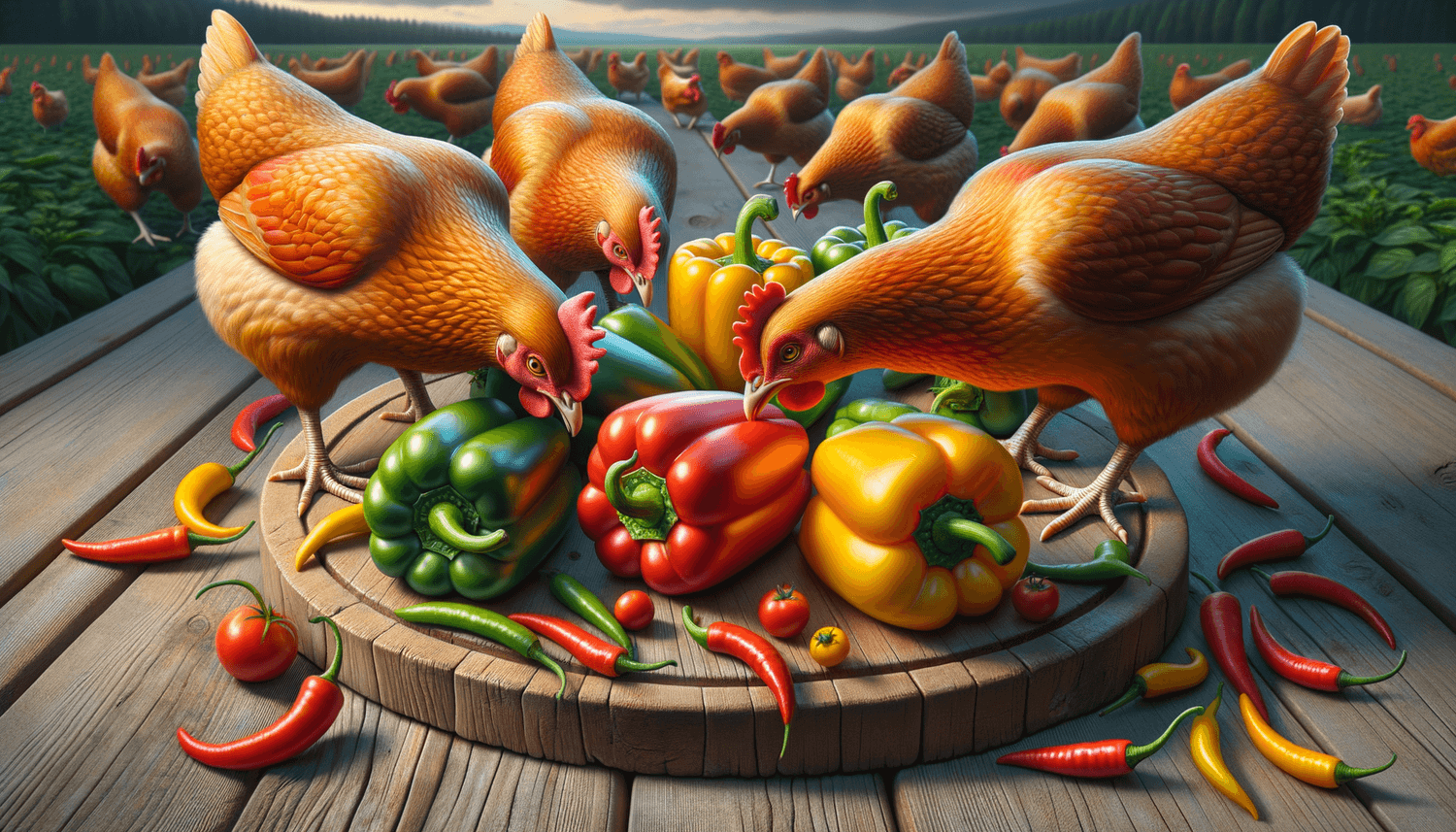Feathers, pecking, and clucking; ah, the charming life of a backyard chicken owner! One question that seems to be on everyone’s mind is ‘Can Chickens Eat Bell Peppers?’ It turns out that our feathery friends have quite the palate, and we’re here to give you the scoop! Join us as we dive into the world of chickens and bell peppers, covering everything from the importance of a balanced diet to the nutritional value of these colorful veggies. We’ll even share some tips on how to prepare bell peppers for your flock! So, grab your straw hat and garden gloves, and let’s get clucking!
Can chickens eat bell peppers?
Yes, chickens can eat bell peppers and it is safe for them to do so. Bell peppers are not only non-toxic, but they also contain a variety of vitamins and nutrients that are beneficial for chickens. However, bell peppers should be fed in moderation and as a part of a balanced diet to ensure optimal health for your feathery friends.
Finding balance in a chicken’s diet
Just like humans, chickens need a balanced diet to thrive and maintain optimal health. A chicken’s diet should primarily consist of high-quality chicken feed, which provides them with the essential nutrients, vitamins, and minerals they need to grow, lay eggs, and maintain overall health. In fact, chicken feed should make up around 80-90% of their diet.
The remaining 10-20% of a chicken’s diet can be an assortment of treats, like fruits and vegetables. These treats not only add variety and flavor to their diet but also offer valuable nutrients and health benefits. However, it’s essential to provide these treats in moderation so as not to disrupt the balance of nutrients provided by their primary chicken feed.
Nutritional value of bell peppers for chickens.
Feeding bell peppers to chickens offers some valuable nutritional benefits. Bell peppers are packed with vitamins and minerals that can promote the health and wellbeing of your flock. For example, they contain high levels of vitamins A, C, and E, which are important for maintaining a robust immune system, proper eyesight, skin health, and antioxidant protection. These vitamins boost the overall health of your chickens, making them less susceptible to diseases and ensuring that they live a happy, healthy life.
In addition to these vitamins, bell peppers are also rich in minerals such as potassium, which helps chickens with muscle and nerve function, and manganese that promotes bone health and efficient metabolism. These essential minerals contribute to the flock’s overall strength and fitness, ensuring they grow at an appropriate rate and lay eggs consistently.
Bell peppers also have a high water content, which can contribute to the hydration levels of your chickens. Adequate hydration is essential, particularly during the hot summer months, and offering treats like bell peppers can be an additional way to encourage water intake. While bell peppers should not replace the primary source of hydration – access to clean, fresh water – they can provide supplementary hydration and help keep your birds comfortable in warmer weather.
Nutrition table of bell peppers for chickens.
| Information | Description |
|---|---|
| Nutritional Value | Rich in vitamins A, C, and E, as well as minerals like potassium and manganese |
| Suggested Serving Size | Small amounts in moderation as part of the 10-20% treat portion of their diet |
| Safe Feeding Practices | Wash and remove seeds before feeding, as seeds can be a choking hazard |
| Preparation | Chop into small pieces or strips, making it easy for chickens to peck and consume |
| Potential Risks | Can cause digestive issues if fed excessively or without proper moderation |
| Hydration | High water content provides supplementary hydration, especially during hot weather |
| Digestion | Easily digestible, but should be offered as a treat alongside a balanced diet |
| Seasonal Availability | Typically available year-round, but best during the summer months |
| Other Benefits | Offers variety and flavor, promoting a well-rounded diet and overall health |
Other suitable treats for your chickens
Beyond bell peppers, there are many other fruits and vegetables that make excellent treats for your backyard chickens. Some popular options include leafy greens, such as spinach and kale, which contain essential vitamins and minerals. Additionally, berries, such as strawberries and blueberries, are nutritious and delicious treats that can be enjoyed by your flock. In general, it’s essential to ensure that any fruit and vegetable treats you offer are non-toxic and safe for consumption.
Avoid potentially harmful foods
While fruits and vegetables like bell peppers are safe for chickens, there are some foods that can be toxic or dangerous for your birds. Some examples of foods to avoid are avocados, chocolate, onions, garlic, and raw potatoes. These foods can have detrimental effects on your chickens’ health and may even be fatal in some cases. Always research and verify the safety of a particular food before offering it to your chickens.
Creating a tasty and healthy treat mix
To provide variety and excitement in your chickens’ diet, you can create a treat mix consisting of bell peppers, other suitable fruits and vegetables, and even some high-protein items like mealworms. Mix these treats together and scatter them in their coop or run, encouraging natural foraging behavior and providing exercise and mental stimulation. This will not only ensure a balanced diet, but it will also contribute to the overall happiness and wellbeing of your flock.

















